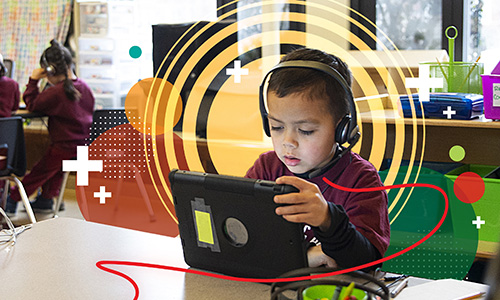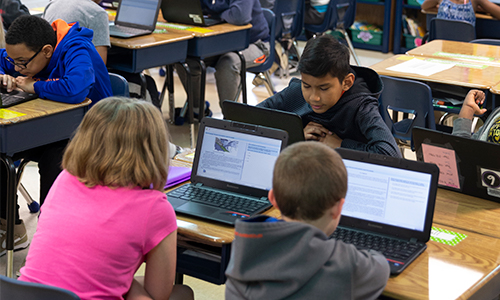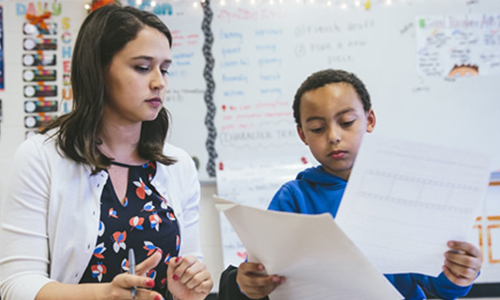Journal article
Seven successful strategies for literate assessment
2018
Principal Leadership 18
By: Beth Tarasawa, Amelia Wenk Gotwals, Cara Jackson

Abstract
Evidence that suggests principals’ knowledge and skills in relation to assessment leadership—such as incorporating professional development, use of assessment data in classroom planning, and nurturing professional collaboration on matters of student achievement and instruction—are of fundamental importance to building assessment literacy among their teachers. While tests are often the first thing that comes to mind when you hear the word “assessment,” a balanced assessment system encompasses a wide range of methods for evaluating a child’s academic, social, and emotional abilities. We offer seven research-supported assessment practices that support classroom learning.
See MoreThis article was published outside of NWEA. The full text can be found at the link above.
Associated Research
Related Topics


MAP Reading Fluency with Coach Evidence Base
This document provides an overview of the research underlying MAP Reading Fluency with Coach’s AI-powered intelligent reading tutor and the research on key elements of early literacy instruction. It describes the components of the MAP Reading Fluency with Coach pedagogy and the research base supporting each component.
By: Amy Endo
Products: MAP Reading Fluency
Topics: Early learning, Empowering educators, Innovations in reporting & assessment, Reading & language arts


District and school leaders’ perspectives on leading & learning during the COVID-19 pandemic
This report captures the perspectives of district, school, and teacher leaders (hereafter referred to as “local leaders”) to surface best practices for supporting student learning during COVID-19.
By: Hayley Weddle, Ayesha K. Hashim, Ogechi Irondi
Topics: COVID-19 & schools, Empowering educators


The instructional legacy of COVID-19: Teacher adaptation in response to the pandemic
This study investigated teacher adaptation to the changes in teaching conditions caused by the transition to distance learning in the COVID-19 pandemic.
By: Helena Connolly, Naina Abowd, Catherine C. Chase
Topics: COVID-19 & schools, Empowering educators


The American Rescue Plan provides $122 billion for COVID recovery in schools. With more than 40 state plans approved, how are districts collecting, monitoring, reporting and learning from the unprecedented interventions? What can districts do now to design and implement data collection processes that will shape collective learning? In this webinar, you will hear how district leaders and researchers are approaching this opportunity to alter life outcomes for generations.
By: David Brackett, Jacob Cortez, Dan Goldhaber, Emily Morton
Topics: COVID-19 & schools, High-growth schools & practices, Informing instruction


Family perceptions of participating in a structured summer kindergarten transition program
Researchers interviewed parents whose children participated in a three-week structured kindergarten transition program designed to promote parental involvement in school, reduce students’ chronic absenteeism, and increase children’s readiness for kindergarten. Interviewees expressed that participating in the program yielded benefits for themselves and their children, and proposed various ways that adjusting the program could better meet the needs of all stakeholders. Parent suggestions were synthesized into multiple implications for practice and substantiated by current relevant literature.
By: Christopher Merideth, Beth Cavanaugh, Sue Romas, Nicole Ralston, Eva Arias, Beth Tarasawa, Jacqueline Waggoner
Topics: Early learning, Empowering educators


Addressing COVID-19’s disruption of student assessment
In this Inside IES Research blog, RAND and NWEA researchers share some early findings from their work under an IES grant to develop strategies for schools and districts to address the impacts of COVID-19 disruptions on student assessment programs. In the blog, they describe some key findings from surveys and interviews on key concerns of districts and schools arising from the lack of assessment data from spring 2020.
By: Jonathan Schweig, Andrew McEachin, Megan Kuhfeld
Topics: COVID-19 & schools, Empowering educators


A “Lost Year” of Data? What Disruptions From COVID-19 Mean For Education Research
This Bellwether Education Partners webinar examines how education research can continue to offer meaningful, relevant information to policymakers and practitioners after the “lost year” of data from COVID disruptions to schools and testing.
By: Matthew Soldner, Megan Kuhfeld, Dan Goldhaber, Constance Lindsay, Allison Crean Davis
Topics: COVID-19 & schools, Empowering educators, Measurement & scaling



